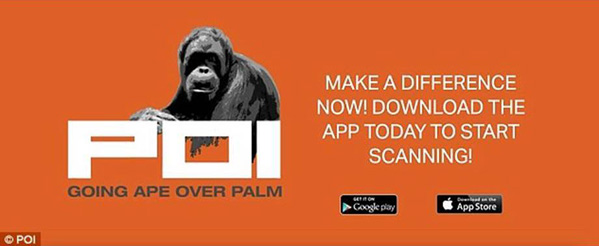
An orangutan orphaned after its mother was killed during forest clearing for an oil palm plantation in Sumatra.
A new app enables iPhone [download] and Android [download] users to scan barcodes to reveal whether household products contain palm oil.
The app, officially released Monday, was conceived by Australia-based Palm Oil Investigations (POI) and developed by Spectrum Solutions. POI says the app, which is geared toward Australian consumers, aims to encourage companies to adopt responsible palm oil sourcing polices.
“It will make it easier for people to choose which products to purchase at the supermarket with the app telling them immediately whether the product contains palm oil and if so, if it has been sourced ethically,” said the group in a statement. “The app has been developed … to pressure brands to alter their palm oil sourcing, ensuring the oil used in their products is not contributing to deforestation, exploitation, destruction of the eco system, species extinction and human rights issues.”
The app offers five categorizations for products: “palm oil free”, “active no deforestation policy”, “RSPO Certified Sustainable Palm Oil”, “RSPO Mass Balance (mixed certified with uncertified)”, and “FAIL” meaning the palm oil has been sourced without any social or environmental safeguards. POI considers the last two results as the worst options and offers consumers a chance to take direct action when they appear.
“For an RSPO Mass Balance or FAIL result, the app will automatically suggest an alternative product and the consumer can send an automated email to the brand’s customer service department encouraging them to shift their product(s) into one of the 3 higher categories,” said POI.

Lorinda Jane, Founder and President of POI, said the app is a response to confusion in Australia about what products contain palm oil.
“Due to the lack of labelling laws within Australia, palm oil is a hidden ingredient and often impossible for consumers to identify on products as there are over 200 names for it,” Jane said in a statement. “Palm oil can be found in around 40% of items on supermarket shelves and to date, our small team have loaded over 110,000 products into the app ready to scan.”
“The demand for this app is growing every day. Our social media followers are constantly asking whether the products they are purchasing are palm oil free and if they aren’t, whether the palm oil has been sourced ethically. This app removes any confusion as the consumer gets an answer as soon as the product is scanned.”

Deforestation for palm oil production in Malaysia
She added that the app offers an alternative to boycotting palm oil, a tactic that many say is unlikely to be effective to due the low cost of palm oil and the amount of product that is consumed outside Western markets.
“We know that removing palm oil is not the answer, however if a brand cannot sign on to a no deforestation policy to track their supply and remove deforestation and exploitation from their supply chain or switch to certified palm oil now then they must completely remove the oil from their products,” Jane explained. “Many brands are lagging behind and in turn contributing to the problem.”
“The solution lies in regulating palm oil because no matter how much consumers decide to boycott palm oil, it is here to stay. The app however has given consumers the choice and brands that are doing the right thing need to be commended not boycotted so that other brands follow suit.”